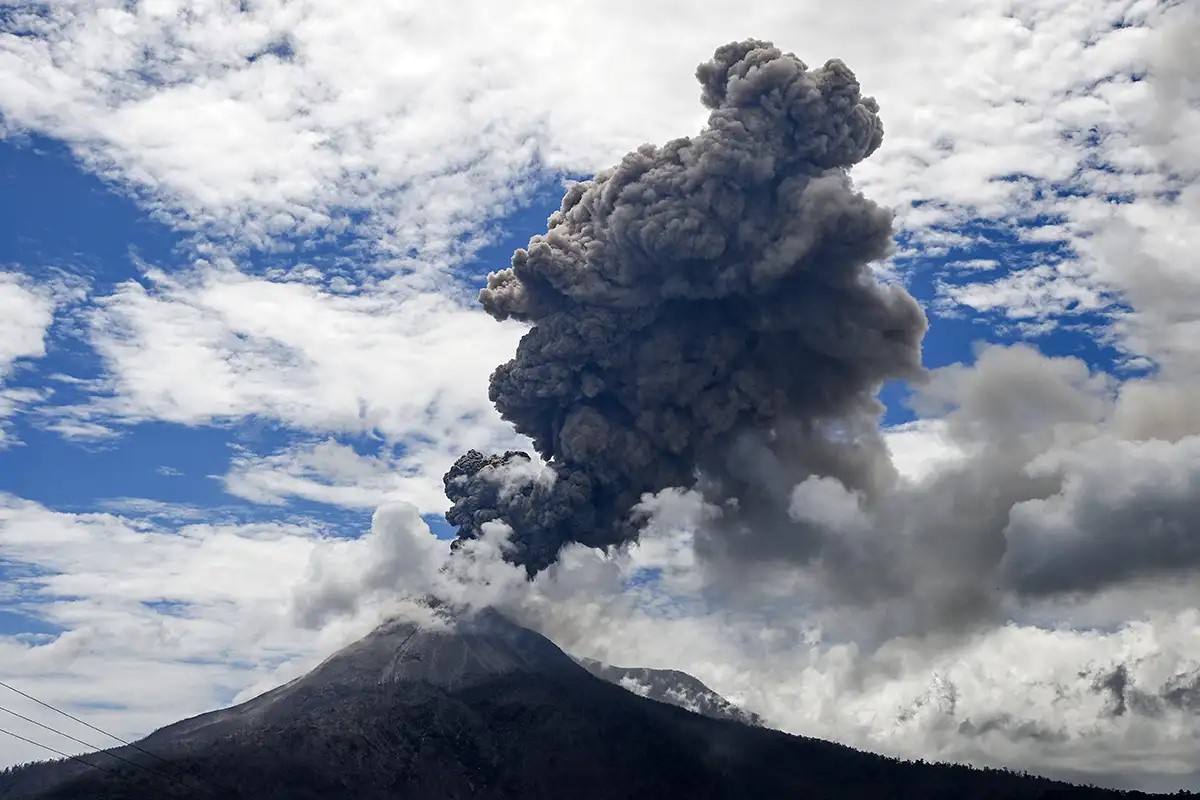An immense column of volcanic ash rising from Indonesia’s Mount Lewotobi Laki-laki has blanketed the skies near Bali, prompting major airlines to cancel flights and alert travelers of significant travel disruptions. This eruption, occurring just a week after a deadly volcanic event that claimed ten lives, has once again underscored the volatile natural landscape of the Indonesian archipelago, where volcanoes and seismic activity remain constant forces. With a 9-kilometer-high ash plume now hovering over the region, airlines have opted to halt Bali-bound flights, prioritizing safety amid escalating concerns.
On Wednesday, Australian airlines including Qantas, Jetstar, and Virgin Australia began notifying passengers of the risk posed by the ash cloud, which has rendered air travel hazardous. The volcanic ash, dense enough to impact visibility and potentially harm aircraft engines, is being closely monitored by meteorological teams. Virgin Australia, addressing the challenges posed by the eruption, confirmed the cancellation of all flights to and from Bali for the day. Their statement reiterated that “safety is always our highest priority,” a sentiment echoed across the industry as airlines balance customer needs with the unpredictable hazards of volcanic activity.
Jetstar, similarly affected by the eruption, extended its cancellations through Thursday at noon Australian Eastern Daylight Time (04:00 GMT). Airlines across the region have responded in kind; Cathay Pacific, IndiGo, and AirAsia all issued notices suspending flights to Bali, while Singapore Airlines and its low-cost carrier Scoot managed to continue limited operations, underscoring the volatile and shifting nature of the situation. The Australian Bureau of Meteorology issued additional warnings that ash may drift as far as northern Australia by Wednesday, signaling a broader geographical reach of the eruption’s effects.
The impact has been especially acute at Bali’s Ngurah Rai International Airport, where general manager Ahmad Syaugi Shahab reported that at least 22 international flights and 12 domestic flights were cancelled as of Tuesday. The ash fallout has upended travel for thousands of tourists and locals, leaving many travelers stranded or forced to alter their plans. While airport authorities have worked diligently to provide information to passengers, the nature of volcanic activity introduces an element of uncertainty that has made it challenging to predict when flights may safely resume.
Beyond aviation, the ash cloud has brought further disruptions to other sectors, particularly events and festivals. In Labuan Bajo, a town approximately 600 kilometers from Mount Lewotobi, a jazz festival set for this week was postponed until next year due to safety considerations, demonstrating the extensive reach of the ash’s impact. As residents and visitors across the region await updates, the eruption’s aftermath has cast a somber tone over what would typically be a period of celebration and leisure.
Indonesia’s geographic position along the Pacific “Ring of Fire” has endowed the nation with a spectacularly active volcanic landscape, attracting scientists, nature enthusiasts, and tourists alike. With around 130 active volcanoes, Indonesia faces ongoing challenges from natural disruptions. Previous eruptions, such as the one at Mount Merapi in 2020, led to similar travel interruptions, grounding flights and highlighting the balancing act between Indonesia’s natural beauty and the safety challenges that accompany volcanic activity. The country’s airports, airlines, and meteorological agencies have developed robust safety protocols to address these events, ensuring that passenger security remains at the forefront as they continue to respond to the current crisis.
As conditions evolve, the ash cloud from Mount Lewotobi Laki-laki has underscored the need for vigilance among airlines and travelers alike. Though travel plans have been thrown into disarray, the event serves as a reminder of the unpredictable and awe-inspiring forces that shape Indonesia’s diverse landscapes. With updates and advisories expected in the coming days, both residents and visitors will be watching closely as Bali and its surroundings respond to the natural spectacle and challenges of this volcanic eruption.






